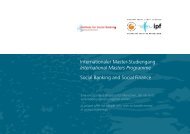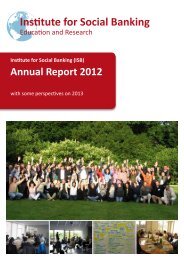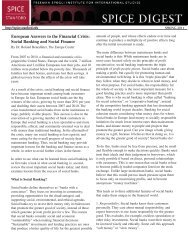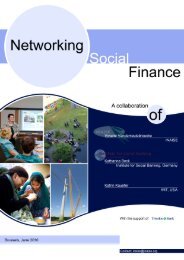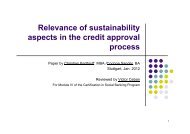Mette Winther-Nielsen - Institute for Social Banking
Mette Winther-Nielsen - Institute for Social Banking
Mette Winther-Nielsen - Institute for Social Banking
- No tags were found...
Create successful ePaper yourself
Turn your PDF publications into a flip-book with our unique Google optimized e-Paper software.
ISB Book Reviewby<strong>Mette</strong> <strong>Winther</strong> <strong>Nielsen</strong>Saturday, 12th of March 2012Certificate in <strong>Social</strong> <strong>Banking</strong>Alanus University
Author Background in<strong>for</strong>mation; Olaf Weber:Born January 27th 1965. Currently Associate Professor and Export DevelopmentCanada Chair in Environmental Finance, University of Waterloo, Canada. Livingin Canada, married, 2 children, and enjoys cycling, football and travelling.Research interests are in the area of environmental and sustainable financewith a focus on sustainable credit risk management, socially responsibleinvestment, social banking and the link between sustainability and financialper<strong>for</strong>mance of enterprises.Educational Training, latest three in reverse chronological order:2004 - Training <strong>for</strong> members of the board of directors (ZfU Training)2001 - Asset and Liability Management (Raiffeisen Schulung)1997 - Dr. (rer. nat), Artificial Intelligence Group, Technical Faculty, Universityof Bielefeld. Doctoral-Thesis: Integration of Knowledge Modules DuringCredit ManagementProfessional Experience, latest three in reverse chronological order:2009-2010 - President of the board of the <strong>Institute</strong> <strong>for</strong> <strong>Social</strong> <strong>Banking</strong>,Bochum, Germany2006-2009 - Member of the board of the <strong>Institute</strong> <strong>for</strong> <strong>Social</strong> <strong>Banking</strong>,Bochum, Germany2004-2009 - Member of the investment board of Care Group AG, Zurich,Switzerland
Author Background in<strong>for</strong>mation; Sven Remer:Born August 12th 1968. Currently Junior Professor <strong>for</strong> <strong>Social</strong> <strong>Banking</strong> and <strong>Social</strong>Finance at Alanus University (60% position) and one of two project leaders <strong>for</strong>a major research project at Alanus University (40% position) called "Studica",studying a la carte" which intends to develop new, flexible study structures also<strong>for</strong> practitioners - with a focus on "<strong>Social</strong>ly Responsible <strong>Banking</strong>", and sinceOctober 2011 with a 10% position with the ISB. Living in Cologne, married toan Indian (Prof. <strong>for</strong> Finance in a German Business School), have a daughter of 3years, who is also his main interestEducational Training, latest three in reverse chronological order:2007 - University of Plymouth, UK, Certificate, European Integrated MastersProgram Tutor Training2006 - <strong>Institute</strong> <strong>for</strong> <strong>Social</strong> <strong>Banking</strong>, Bochum, Germany, Certificate in <strong>Social</strong><strong>Banking</strong> and Finance2002 - CASS Business School, Certificate Teaching, Learning, andAssessmentProfessional Experience, latest three in reverse chronological order:2006 - Forum <strong>for</strong> the Future, London, UK, Research Intern inSustainable Financial Markets Group2001-2005 CASS Business School, London, UK, Researcher and Lecturer1997-1999 KPMG and KPMG Certification, Frankfurt, Germany, Consultant,Trainer and Auditor in Environmental Management
General Positioning of the Book:Contains a complete list of Routledge's international studies in money andbanking prior to the book itself, which contains various chapters abouteverything worth knowing about social banking <strong>for</strong> the time being, written bydifferent kinds of people, each experts on the field on which they have writtentheir chapter.Key words:Past, present and possible future of <strong>Social</strong> <strong>Banking</strong> and FinanceISB Top 50:Definitely yesLink to <strong>Social</strong> <strong>Banking</strong>:Absolutely yesDescription on Book Cover and/or Amazon(or the like), incl. feedback:<strong>Social</strong> <strong>Banking</strong> describes a way of value-driven banking that has a positivesocial and ecological impact at its heart, as well as its own economicsustainability. Although it has a long and successful history, it has arguablynever been more topical than it is now in the aftermath of the latest financialcrisis. Most <strong>Social</strong> Banks came out of this crisis not only unscathed but muchstronger and bigger than they were be<strong>for</strong>e. And contrary to their conventionalpeers, none of the <strong>Social</strong> Banks had to be bailed out with public funds. Thisincreasingly attracts the interest not only of clients searching <strong>for</strong> safe and
sensible ways to deposit their funds but also of conventional banks that beginto understand the potential of a more socially oriented approach towardsbanking.<strong>Social</strong> Banks and the Future of Sustainable Finance is the first book to deliver acomprehensive and detailed overview about the past, present and possiblefuture of <strong>Social</strong> and Sustainable <strong>Banking</strong> <strong>for</strong> researchers, students and aprofessional audience. The authors are experts from research and practice andhave been involved in <strong>Social</strong> <strong>Banking</strong> <strong>for</strong> many years. Thus they combine stateof-the-artexpertise with valuable insider knowledge.The book covers the following topics: the history of <strong>Social</strong> <strong>Banking</strong>, the need <strong>for</strong><strong>Social</strong> <strong>Banking</strong> in the current economy, the particular issues of managing a<strong>Social</strong> Bank as business enterprise, <strong>Social</strong> <strong>Banking</strong> products and services, thespecial role of donations and foundations <strong>for</strong> financing change, theopportunities and challenges <strong>for</strong> <strong>Social</strong> Banks lying ahead, and concretedirections <strong>for</strong> the future of <strong>Social</strong> <strong>Banking</strong>. In addition to these respectiveanalyses are many real-world examples and interviews with representatives of<strong>Social</strong> Banks. As such, this comprehensive collection delivers valuable insights<strong>for</strong> academics, students and professionals who are interested in the growingfield of <strong>Social</strong> <strong>Banking</strong>.
Short Table of Contents:1. <strong>Social</strong> <strong>Banking</strong>, introduction. Olaf Weber & Sven Remer2. <strong>Social</strong> <strong>Banking</strong>, a brief history. Riccardo Milano3. Why do we need social banking. Leonardo Becchetti4. Inside <strong>Social</strong> Banks. Christina Von Passavant5. Products and services. Olaf Weber6. Financing change through giving and donations; an integral part of socialbanking. Antje Toennis7. <strong>Social</strong> banking at the crossroads. Sven Remer8. The future of social banking. Olaf WeberShort Description of Content, chapter 7 and 8 (in general; see earlier section ofthis book review Description on Book Cover and/or Amazon(or the like), incl.feedback):Chapter 7; <strong>Social</strong> banking at the crossroads - a brief description of the Europeanvalue-based banks, their raison d'être due to a main focus on the core functionof banking: an intermediary who trans<strong>for</strong>ms and channels money streams fromthose that have spare funds to those that needs funds, and thus significantlyinfluence important developments, including those concerning social, economicand environmental problems. Which most conventional banks have failed topractice having primarily focused on profit maximization by developing evermore profitable products and services to increase/maximize theirshareholders'/owners' financial profit. But due to the latest financial crisis andthe demand <strong>for</strong> environmental solutions, social
anking is a growing trend and may well - again - be the future of banking.The chapter provides an overview of opportunities and threats, strengths andweaknesses of social banking, substantiated by statements from experts ontheir field of the topics. For example new recruitment and training of staff dueto the rapid growth of social banks.Chapter 8; The future of social banking - a discussion of following themes basedon the remaining chapters of the book, which ends in a conclusion on whatstrategies should be used to secure the future of social banking - in asustainable way both economically and socially:- the size of social banks- future challenges <strong>for</strong> social banking products and services- future strategies <strong>for</strong> future clients- the measurement of the impact of social banking- lowering transaction costs- future human resources management- communicating the interaction between social support and financial returns- the growth of social banks - increasing the impact without diluting ethicsMost discussion and concluding of the chapters are based on the knowledge andcompetence of the editors and other experts, tabels and charts are made by theeditors based on hard core, real and historical facts, <strong>for</strong> example the evidentcontext between deposits and loans in social banks.
Assessment:Negative - there is limited factual knowledge about social banking despite mostof the present value-based banks has been existing <strong>for</strong> decades, which couldcomplicate illuminating the theme of the bookPositive - but this literary work offers diverse knowledge of the past, present -and an educated guess on how to approach the future - of social banking.Possible Audience:The book delivers competent and valuable insights <strong>for</strong> academics, students andprofessionals who are interested in the growing field of social banking.Thank you <strong>for</strong> your attention, and a special thanks to Olaf Weber and SvenRemer <strong>for</strong> helping me out with some of my work on the review.



